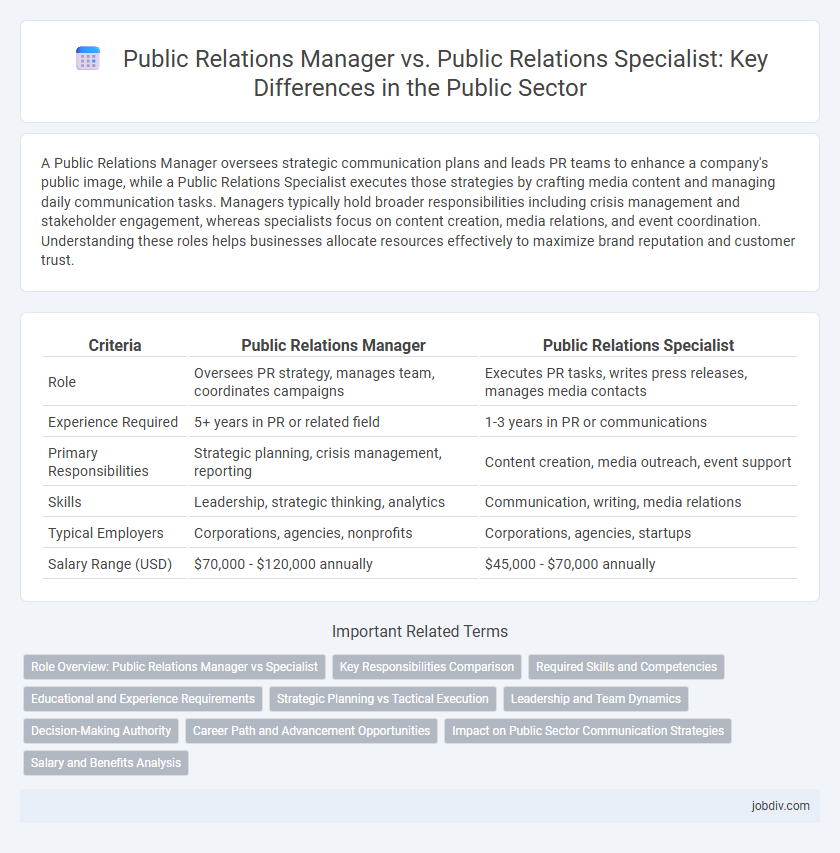A Public Relations Manager oversees strategic communication plans and leads PR teams to enhance a company's public image, while a Public Relations Specialist executes those strategies by crafting media content and managing daily communication tasks. Managers typically hold broader responsibilities including crisis management and stakeholder engagement, whereas specialists focus on content creation, media relations, and event coordination. Understanding these roles helps businesses allocate resources effectively to maximize brand reputation and customer trust.
Table of Comparison
| Criteria | Public Relations Manager | Public Relations Specialist |
|---|---|---|
| Role | Oversees PR strategy, manages team, coordinates campaigns | Executes PR tasks, writes press releases, manages media contacts |
| Experience Required | 5+ years in PR or related field | 1-3 years in PR or communications |
| Primary Responsibilities | Strategic planning, crisis management, reporting | Content creation, media outreach, event support |
| Skills | Leadership, strategic thinking, analytics | Communication, writing, media relations |
| Typical Employers | Corporations, agencies, nonprofits | Corporations, agencies, startups |
| Salary Range (USD) | $70,000 - $120,000 annually | $45,000 - $70,000 annually |
Role Overview: Public Relations Manager vs Specialist
Public Relations Managers oversee strategic communications, directing campaigns and managing media relations to enhance brand reputation, while Public Relations Specialists execute these strategies by crafting press releases and handling day-to-day media inquiries. Managers focus on leadership, planning, and evaluating PR outcomes, whereas Specialists concentrate on content creation and relationship building with journalists and stakeholders. The manager role demands extensive experience and decision-making skills, contrasting with the specialist's operational and tactical responsibilities.
Key Responsibilities Comparison
A Public Relations Manager oversees strategic communication plans, manages media relations, and leads PR campaigns to enhance organizational reputation, while a Public Relations Specialist focuses on executing these plans, writing press releases, and maintaining daily media contacts. The manager holds a leadership role involving budget management and team supervision, whereas the specialist handles tactical tasks such as content creation and event coordination. Both roles require strong communication skills but differ in scope, with managers prioritizing strategy and specialists emphasizing implementation.
Required Skills and Competencies
A Public Relations Manager requires advanced skills in strategic planning, leadership, crisis management, and media relations, alongside strong analytical abilities to oversee campaigns and measure impact effectively. In contrast, a Public Relations Specialist focuses on excellent communication, writing proficiency, social media expertise, and event coordination to implement and support PR initiatives. Both roles demand proficiency in relationship-building, content creation, and adaptability to fast-paced media environments, but managerial positions emphasize decision-making and team leadership competencies.
Educational and Experience Requirements
A Public Relations Manager typically requires a bachelor's degree in communications, public relations, journalism, or a related field, along with 5-7 years of experience in PR or media relations. In contrast, a Public Relations Specialist often needs a similar educational background but with 1-3 years of experience focusing on executing PR campaigns and media outreach. Managers are expected to have advanced skills in strategic planning and team leadership, while specialists concentrate on content creation and client communication.
Strategic Planning vs Tactical Execution
A Public Relations Manager primarily focuses on strategic planning, developing comprehensive communication strategies that align with organizational goals and managing overall brand reputation. In contrast, a Public Relations Specialist emphasizes tactical execution, implementing specific campaigns, handling media relations, and producing content to achieve immediate communication objectives. Effective public relations campaigns require seamless collaboration between the manager's strategic oversight and the specialist's operational expertise.
Leadership and Team Dynamics
A Public Relations Manager oversees strategic leadership, guiding the PR team to align messaging with organizational goals while fostering collaboration and motivation among team members. In contrast, a Public Relations Specialist focuses on executing communication tactics and maintaining strong media relationships within the team framework. Effective leadership from the manager enhances team dynamics by promoting clear roles, accountability, and a unified approach to public engagement.
Decision-Making Authority
A Public Relations Manager holds greater decision-making authority, overseeing strategic planning and approving communication campaigns aligned with organizational goals. In contrast, a Public Relations Specialist typically executes assigned tasks and manages day-to-day media relations without final approval responsibilities. The Manager's role includes budget allocation and crisis response decisions, while the Specialist focuses on content creation and stakeholder engagement under guidance.
Career Path and Advancement Opportunities
A Public Relations Manager typically oversees PR campaigns, manages teams, and strategizes communication efforts, positioning them for higher executive roles such as Communications Director or VP of Public Relations. In contrast, a Public Relations Specialist focuses on executing specific PR tasks like writing press releases and media relations, which builds foundational skills crucial for progressing to manager-level positions. Career advancement for managers often involves broader leadership responsibilities and strategic decision-making, while specialists advance by developing specialized expertise and demonstrating successful campaign execution.
Impact on Public Sector Communication Strategies
Public Relations Managers in the public sector oversee strategic communication plans that shape government transparency and public engagement, ensuring messaging aligns with policy objectives. Public Relations Specialists execute targeted communication tasks, such as media relations and content creation, directly influencing how public information is perceived and disseminated. Both roles are critical in enhancing the effectiveness of public sector communication strategies by fostering trust and promoting organizational goals.
Salary and Benefits Analysis
Public Relations Managers typically earn higher salaries than Public Relations Specialists, with median annual earnings ranging from $70,000 to $120,000 compared to $45,000 to $75,000 for specialists. Managers often receive enhanced benefits packages including performance bonuses, stock options, and executive health plans, reflecting their strategic role and leadership responsibilities. Specialists benefit from standard health insurance and retirement plans, with opportunities for skill development and certifications to boost career progression.
Public Relations Manager vs Public Relations Specialist Infographic

 jobdiv.com
jobdiv.com